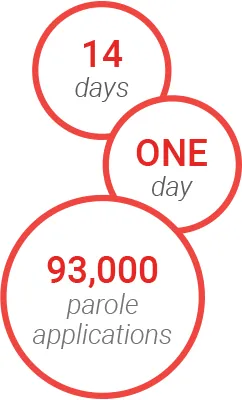Background:
The sudden and unexpected change of political leadership in Afghanistan following the US military withdrawal in 2021 resulted in a humanitarian crisis in the country. In response, President Biden launched Operation Allies Welcome (OAW), to provide a new home for Afghan allies and their families. These remarkable individuals, including military officers, translators, locally employed Department of State staff, journalists, and human rights activists, willingly undertook immense risks to support our troops and personnel on the ground. In addition to extending protection to our Afghan allies, the operation was also important to safeguard our national security.
As part of a multi-agency effort, USCIS was tasked to ensure that those seeking entry do not pose a national security or public safety risk – to process the “good actors” quickly and keep “bad actors” out.

Challenge:
Prior to the US withdrawal from Afghanistan in 2021, USCIS used manual processes and a legacy system (CAMINO) to process Humanitarian Parole (HP) cases to allow travel to the United States. CAMINO’s restricted capabilities and lack of automated systematic checks required immigration officers to manually inspect up to 3 different classified external systems, leading to long processing timeframes: an average of 90-120 days.

In June 2023, President Biden announced the OAW Re-Parole program to extend the parole (lawful presence) and work authorization of the Afghan allies in the United States who were still awaiting adjudication of the applications for asylum or lawful permanent residence. USCIS Management, knowing that the Re-Parole program was on the horizon, asked the ELIS team in May to begin working on building a new module that would streamline the I-131 Humanitarian Parole and Work Authorization process and provide enhanced vetting for the OAW Re-Parole population before their parole expired in August 2023. REI and USCIS successfully designed, developed, tested, and launched the new capability in just 5 weeks.
Approach:
To support the OAW mission, our teams leveraged Agile Kanban methodology and DevSecOps practices to successfully implement the new I-131 Humanitarian Parole module in ELIS in the short timeframe allotted.
With its visual representation of workflows, flexible prioritization, and continuous delivery and improvement framework, the Agile Kanban methodology enabled the team to focus on developing the right functionalities at the right time to maximize customer value. DevSecOps practices enabled the team to build in security from the outset, relying on automation and enhanced risk management.
In 5 weeks, the team developed the following functionalities:
- Enhanced National Counter Terrorism Center (NCTC) Checks microservice to include I-131 OAW referrals as a separate batch. This microservice leverages AWS S3 buckets, JMS and ActiveMQ for validating applicant data by NCTC users.
- A new interface with CBP for National Vetting Center (NVC) checks allowing for a coordinated review of relevant intelligence and law enforcement information for all applicants. The interface leveraged a connection to CBP from another USCIS system, GLOBAL. To ensure the security of this interface with other agencies’ systems, we leveraged the existing security of ELIS’s Internal ActiveMQ server only to allow trusted entities access to read and write messages to and from these systems.
The work also included developing new screens in ELIS for officers to review NVC check statuses and results. The interface was tested extensively in coordination with USCIS GLOBAL and NVC technical teams. Once the system was live, observations also led to further process improvements, reducing system load and increasing response times. - A new interface with the legacy system, CAMINO, to query for additional declared aliases during the Systematic Name Harvesting process in the immigration lifecycle.
- Automated workflow referrals to the Fraud Detection National Security Unit for manual review by officers if hits were returned from classified systems.
- Automated alias and fingerprint checks to external classified systems.
- Automated State Department checks.
- Streamlined Case Processing (SCP) to systematically batch-approve cases that cleared automated screening.

We adhered to data integrity, zero-trust, and security-first philosophies, with multi-stage checks for quality, data integrity, security, static code analysis, and acceptance using cloud-native approaches like centralized code repositories, orchestration, and containerization. Finally, the team followed an Agile Kanban approach to maintain a prioritized product backlog.
Impact:
People are at the heart of USCIS’s mission, and we are proud to have supported that mission by helping the United States keep its commitment to its allies while safeguarding national security. Working alongside stakeholders from USCIS, CBP, and others, we developed solutions to offer shelter to our Afghan allies while saving the agency significant time and costs.
By streamlining case processing, the team has reduced adjudication time for Humanitarian Parole applications to an average of 14 days, a substantial reduction from the previous 90-120 days the CAMINO system required.
- Cases that don’t require a manual review at any step in the adjudication process can be processed as fast as one day using the new functionality added to ELIS.
- To date, USCIS has processed more than 93,000 parole applications, which includes (a) ~43,000 automatic parole extensions (b) ~15,000 approvals (c) ~5,000 rejections (d) ~7,500 closed for administrative reasons (ex: a different application for a benefit was already processed) and (e) ~22,500 still under processing.
All Americans benefit in two ways:
- Foreign nationals in other countries where the US may take future military action will more likely trust and cooperate with the US military because we have kept our country’s promises.
- Due to the success of the Humanitarian Parole development in ELIS, the White House has directed USCIS to re-use the team’s solution to build new immigration and asylum benefits in ELIS to meet the agency’s mission of supporting our allies and those seeking asylum and protecting our national security.
In summary, our solution relieved the pressure to process security checks quickly (i.e., to help our Afghan allies escape imminent, life-threatening danger) while still providing the best possible security assurances that we were not allowing entry into the US by persons who might want to do us harm. The combination of technological efficiency and security policy compliance makes this innovation likely to be emulated in many different circumstances.
Due to the success of the Humanitarian Parole development in ELIS, the White House has directed USCIS to re-use the team’s solution to build new immigration and asylum benefits in ELIS to meet the agency’s mission of supporting our allies and those seeking asylum and protecting our national security.
Copyright © 2024 REI Systems. All rights reserved.



 By streamlining case processing, the team has reduced adjudication time for Humanitarian Parole applications to an average of
By streamlining case processing, the team has reduced adjudication time for Humanitarian Parole applications to an average of 

